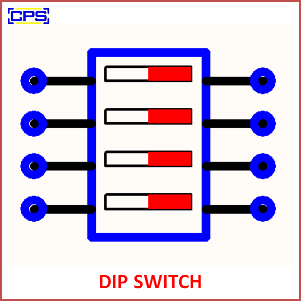A DIP switch (Dual In-line Package switch) is a manual, mechanical switch packaged in a standard dual in-line configuration. It is used in electronic circuits to enable or disable functionality, configure device settings, or select operational modes.

Key Features of a DIP Switch:
- Structure:
- Consists of a series of small, toggle switches mounted on a single package.
- Each switch can be set to an ON or OFF position, representing binary states (1 or 0).
- Configuration:
- Typically used in applications where settings need to be set once or changed infrequently.
- Mounting:
- Available for through-hole or surface-mount installation on printed circuit boards (PCBs).
Types of DIP Switches:
- Slide Type: Each switch slides between ON and OFF positions.
- Rocker Type: Uses a rocking motion to toggle the switch.
- Rotary Type: Circular switches that rotate to select different settings.
Applications:
- Hardware Configuration: Setting device IDs, communication protocols, or modes of operation.
- Address Selection: Configuring addresses in communication devices like modems and routers.
- Debugging: Enabling or disabling features during circuit testing.
- Embedded Systems: Adjusting system parameters without the need for software reprogramming.
DIP switches are valued for their simplicity, reliability, and ease of use in configuring and customizing electronic systems.
